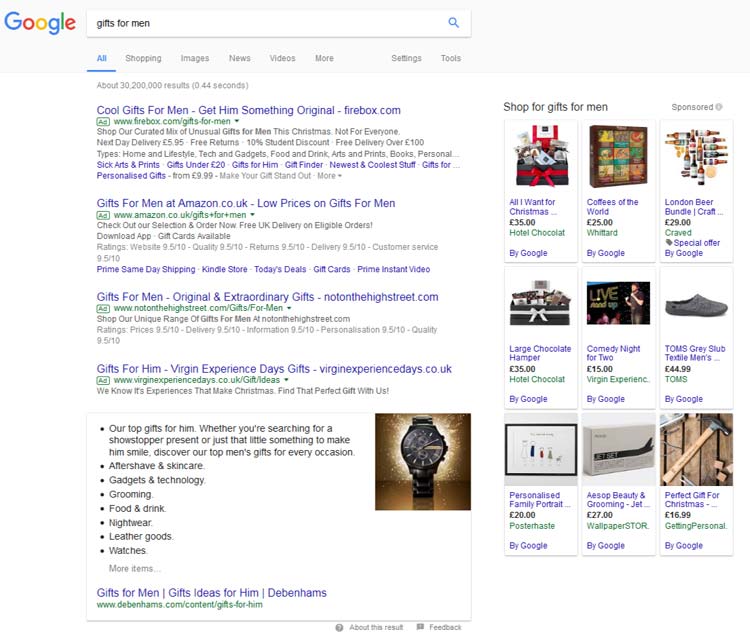SEO Trends 2018 – 6 Bold eCommerce Predictions For SEO
SEO is dead in 2018!
Oh, wait, we’ve heard that before and SEO is alive and kicking. As long as search results are sorted in a list, companies will benefit from being at the top of that list and SEO is the way to do it.
But one thing has become clearer in 2017 and shapes 2018’s trends: to Google, Google is a not a directory. Google is a destination. Google is where people find answers, research, shop, call businesses and more. Any connection that Google may make between a person and your site is a happy coincidence for you.
As such, at the core of my SEO predictions for 2018 is a simple thought: feed the beast.
Google needs your information to be a destination – and will let you enjoy the fringe benefits – so load a shovel full of your finest data and get ready to thrust it into Google’s hungry maw.
1) Voice Search Will Not Be Crucial for eCommerce
With mobile and home assistant devices all growing throughout 2017, voice search has definitely joined mainstream search behaviour – though there’s a long way to go before it comes close to text search.
Voice search is best suited to time in vehicles, where people need to be hands-free, and at home, where the privacy helps as does the context of multitasking away from a screen. As such, the majority of voice searches for 2018 are going to remain focused more on local, how-to, urgent or idle whim curiosities. Consider terms such as:
- “Where’s the nearest petrol station?”
- “How do I make a margarita?”
- “What’s the weather in Brighton tomorrow?”
- “When’s a good time to visit Japan”
These are informational searches and when the device, likely without a screen, has provided the answer, the search is over. That information may be pulled from your site, but no connection is made to it.
However, there is a growing trend for research-based searches, which could mean more “what’s the best [product in category]?” or a combination of local and research, like “What’s the best Italian restaurant near me?”
Here, the answer is less likely to be pulled from your site but is definitely where you want your brand to be heard. This means getting featured on the authoritative sites that drive this information, which isn’t a whole lot different to the blogger and online media relationships you should be building already.
Though Google Home allows grocery purchases in the US and Alexa allows Amazon Prime purchases, I believe these are more issues for business partnerships than a revised search strategy.
Recommendations:
- If you are a local business, you need a good local SEO strategy. Feed the beast with consistent data about your site, get lots of (positive) reviews in Google and build citations from relevant local directories.
- If you are focused on selling products, much as with eCommerce SEO now, consider the research terms people may be using and how you will rank in those ‘best of’ lists and keep getting noticed.
- Don’t get caught in additional hype about voice just yet!
2) Featured Snippets Will Keep Making SEO Lopsided (and Will Be Crucial for eCommerce)
Google really stepped up its game with featured snippets in 2017 – and they are a perfect example of Google trying to satisfy a query in situ rather than taking a browser to your site.
In fact, with Search Ads, Shopping, Snippets, map packs, video results, image results etc. etc., the amount of content above the number 1 SEO spot is growing every month, which makes that result less impactful than it once was (unless your customers are more likely to be among the 20% of UK people using ad blocking software).

This year saw the range of terms these snippets cover expand greatly and move onto terms that are more eCommerce related rather than purely informational e.g., gifting ideas. While this is arguably similar to the voice searches we looked at, the key difference is that these searches are always in a screen-based environment and the search is the start of a journey that could lead to your site.
What’s also important is that the answer to queries aren’t always sourced from objective sites; answers are often coming from eCommerce sites.
We have consistently seen huge growth for our clients in traffic and sales when achieving these placements. These slots could even be seen as the new organic top slot, such is the impact, and this is definitely where you want to be.
Recommendations:
- Create short, pithy and informational content for your key category pages as soon as possible to try to bait Google into using your site for answers.
- Use specific details, rather than just keywords, to make a relevant answer as well as using structured content to show Google where to look for the data.
- Review your site content overall to make sure there is a strong buying journey from that page or “hook” factor to keep people there once they’ve clicked.
- If your budget allows, consider if an eCommerce PPC strategy might help deliver your goals and secure the visibility you want – just make sure to have an integrated channel strategy so your paid efforts don’t cannibalise your SEO.
3) Search Queries Become Longer – And More Homogenous
The latest reports show that time spent online on mobile devices has now overtaken time on desktops and 48% of mobile research starts with search. Even though desktops are still the chief platform for conversion, mobile is now vital for your brand’s discovery, especially if your target audience is millennials.
However, mobile search requires typing on a limited, slower keyboard while faster 4g connections allow Google to quickly make autocomplete/autocorrect suggestions, which users can simply click on to save time and effort.
Nothing particularly new here except that that Google’s predictions have, I believe, become longer and more specific, which drives more long-tail searches. For example, the term “luxury gifts for men who have everything” has an average of 720 searches a month in the US – and I am willing to bet this is hugely driven by Google’s prompt.

On top of this, Google has also become much better with understanding and grouping synonyms and plurals, which means keywords spread a little farther – and that it’s a lot less easy to score SEO points by focusing on a variant of a keyword your competition isn’t using.
This improved understanding will, I believe, ultimately tie in with supporting voice search, where the length and detail of people’s queries for the same piece of information can vary wildly. As such, preparing here is both good SEO now and future proofing for when voice search is something to get excited/panic wildly about.
Recommendations
- The trick here is not to have a page for every keyword and long-tail variant. As Google gets better with synonyms, you’ll just be creating more potential conflict.
- Rather, be aware of long-tail searches, and ascertain the ones most valuable to you, and build your onsite content to go deeper, taking in these terms, synonyms and contextual language.
- If your category level content is wide but thin, review it soon to consolidate to deeply relevant, authoritative and informative pages that support Google’s hunger for data (and help you get that visibility to drive sales).
4) Mobile First Indexing Will Really Kick Up
A pretty safe bet here: mobile first shopping has been on the cards for a while but the warned ranking drops haven’t realised materialised yet.
I predict 2018 is the year this gets serious, with mobile trends now strong enough to merit this in most markets.
Recommendations
- If your site and mobile experience aren’t up to par, the window is closing to address this. Look at responsive templates and, if a new site is in order, use this as a good opportunity to approach your site structure and content from a search friendly perspective.
5) Bing Will Be a Bit of a Thing
It’s going to take more than a few EU fines to knock Google’s dominance but Bing has managed to hold a consistent 7% share of the search market, with its integration into Windows 10, Cortana, Edge and Xbox helping to keep a user base.
“Bing, ha!”, you might scoff. But consider the number of large professional industries where IT has to be locked down. Consider that most of these businesses use PCs and Windows, that IE/Edge is the default browser and that Bing is the default search engine. Or consider the more mature, less tech savvy computer buyer who’s just happy with what works out of the box. This is Bing’s core audience.
In fact, nearly 20% are 35-44 and 30% have household incomes of $100,000. They are older and more moneyed than the average search user and well worth your time if you sell higher end goods or lifestyle services.
Bing ads also tend to cost less per click than Google and Bing has made it very easy to duplicate Google campaigns to their platforms. While Bing is nothing new, I predict that 2018 is the year when people looking to squeeze that extra return on their budget will re-evaluate the platform and find it worthy.
Recommendations
- Despite having an affluent – and often captive – audience, Bing is frequently ignored as a place for tracking rankings or running paid search. As a result, it can be quite different than Google for competition.
- Check out your Bing rankings for your top converting search queries and pages and, if the rankings aren’t there, consider some targeted paid coverage. If budget allows, duplicate any paid campaign to Bing channels if you feel the audience could be a good fit.
6) Google vs Facebook
The big success story for marketing spend in 2017 has to be Facebook. While Google is going broader with its keywords, such as with the Showcase format, Facebook has turned its ability to isolate very particular demographics for highly targeted prospective display advertising into sustained growth.
But, as much information as Facebook may have, Google has even more. While Google’s profiling has been hilariously off-target in the past, I predict 2018 will be the year that Google tries to monetise its data in new ways – and get a slice of that Zuckerberg Pie.
The move to local results area searches is a part of this – pushing a geography demographic attribute on an audience whether they want it or not – but this could be the year that Google relaunches its social platforms, not as a direct Facebook competitor, but as a rival to every local information site and forum going. Think TripAdvisor meets Yelp with a splash of WhatsApp or Instagram.
And as Google remains a destination, powered by the history of every search a user has made, where they’ve been, the photos they’ve taken on their Android phones, the reviews they’ve left, their apps etc. etc. it creates a new opportunity for sponsored results and advertising formats to take on Facebook.
Recommendations
- Pure speculation here! So I recommend you leave us a comment to share your thoughts, predictions and wild guesses for 2018. Is it finally the year we get jetpacks?
Follow my contributions to the blog to find out more about marketing in a digital world, or sign up to the ThoughtShift Guest List, our monthly email, to keep up-to-date on all our latest guides, advice and blog posts.
